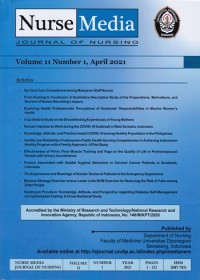
Jurnal
Effectiveness of Pelvic Floor Muscle Training and Yoga on the Quality of Life in Perimenopausal Women with Urinary Incontinence
Background: Urinary incontinence is a symptom of genitourinary disease in perimenopausal women that can seriously affect both physical and mental health and quality of life (QOL). Pelvic floor muscle training (PFMT) and yoga are the exercises that have been applied to treat urinary incontinence. Research that compares the effect of PFMT and yoga on improving the quality of life of women with urinary incontinence is necessary.
Purpose: This study aimed to compare the effectiveness of PFMT and yoga to improve the QOL in perimenopausal women with urinary incontinence.
Methods: A quasi-experimental study with a nonequivalent control group design involving 48 perimenopausal women with all types of urinary incontinence was conducted. The participants were selected by consecutive sampling and equally divided into two groups. Each group was given the PFMT intervention and yoga exercise three times a week for eight weeks. The QOL was assessed using the incontinence impact questionnaire short form (IIQ-7). The data were analyzed by the Mann-Whitney U test, Wilcoxon signed rank test, and paired sample t-test.
Results: The mean (standard deviation) score of total IIQ-7 in the PFMT group were lower (3.58 [2.57]) than that in the yoga group (5.17 [2.14]; p=0.061). There were differences in IIQ-7 score in the domains of physical activity (p
Availability
No copy data
Detail Information
- Series Title
-
Nurse Media Journal of Nursing, Vol. 11 No. 1 April 2021
- Call Number
-
(05) 610.5 DEP n
- Publisher
- Semarang : Department of Nursing, Faculty of Medicine Diponegoro University., 2021
- Collation
-
Hlm. 85-93
- Language
-
English
- ISBN/ISSN
-
2087-7811
- Classification
-
(05) 610.5 DEP n
- Content Type
-
-
- Media Type
-
-
- Carrier Type
-
-
- Edition
-
Vol. 11 No. 1 April 2021
- Subject(s)
- Specific Detail Info
-
-
- Statement of Responsibility
-
-
Other version/related
No other version available
File Attachment
Comments
You must be logged in to post a comment
 Computer Science, Information & General Works
Computer Science, Information & General Works  Philosophy & Psychology
Philosophy & Psychology  Religion
Religion  Social Sciences
Social Sciences  Language
Language  Pure Science
Pure Science  Applied Sciences
Applied Sciences  Art & Recreation
Art & Recreation  Literature
Literature  History & Geography
History & Geography